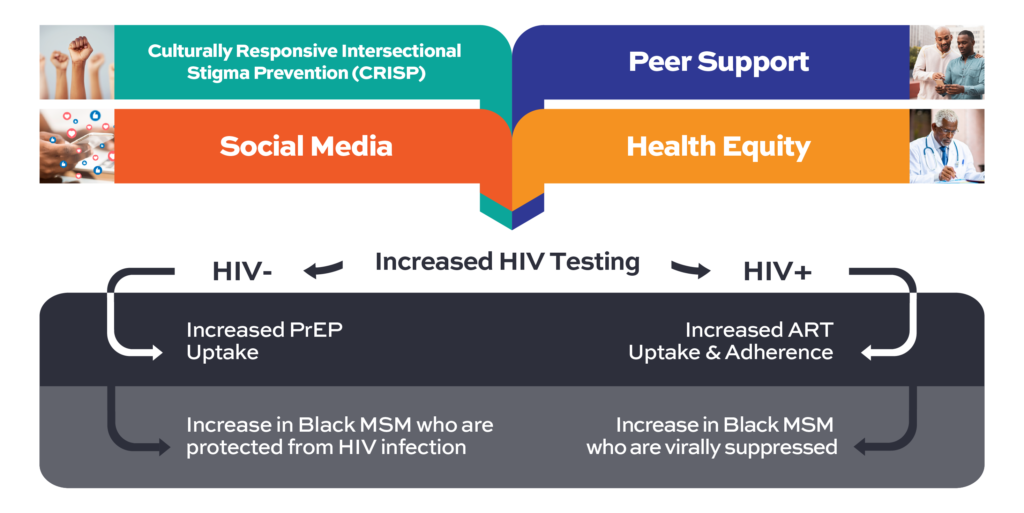What is HPTN 096?
HPTN 096: Building Equity Through Advocacy is an HIV prevention study aiming to reduce HIV rates among Black men (inclusive of cisgender and transgender men) who have sex with men (MSM) in the southern U.S.
How is HPTN 096 trying to reduce HIV?
HPTN 096 is testing four combined strategies to reduce HIV among Black MSM in the U.S. South HPTN 096 is testing an integrated strategy intervention to reduce HIV among Black living in the southern US. The intervention is designed to increase HIV testing in all Black MSM, increase viral suppression among those living with HIV, and increase pre-exposure prophylaxis (PrEP) use among those living without HIV. The intervention is made up of four components and is being tested against the current standard of care, which includes ongoing local efforts to promote HIV prevention and care.
Where is HPTN 096 taking place?
A total of 16 communities are participating in HPTN 096. Of the 16 study communities, eight were randomized to participate as intervention communities, and eight were randomized to participate as standard-of-care (SOC) communities. In the intervention communities, Black MSM will be exposed to both the study intervention and the current standard-of-care. In the standard-of -care communities, Black MSM will only be exposed to the current standard-of-care. Four of the 16 communities are participating in the pilot phase of HPTN 096: Houston TX, Dallas TX, Montgomery AL, and Greenville SC.
Why is the HIV Prevention Trials Network conducting HPTN 096?
Black MSM living in the southern U.S. are among the hardest hit by the HIV epidemic. In 2019, MSM accounted for 60% of the new HIV diagnoses among African Americans in the South – nearly twice that of their other racial/ethnic counterparts. Homophobia, femmephobia and other related stigmas, discrimination, and inconsistent or challenging access to adequate healthcare, are all factors in the continued epidemic.
Despite the advances in effective biomedical interventions such as oral PrEP, the reach and impact of these interventions is lacking in the Black MSM community. HPTN 096 is designed to address structural, social, and behavioral issues that may make accessing health care difficult, while working to improve existing HIV care and prevention options in communities that have been adversely affected and negligently supported.
What are the four components that make up the HPTN 096 intervention?
- Culturally Responsive Intersectional Stigma Prevention (CRISP) – An integrated package of training, skills building, technical assistance, and quality improvement activities designed to help healthcare facilities optimize the healthcare experience of Black MSM along the HIV continuum of prevention and care.
- Peer Support – Serving as role models, Peer Supporters establish mutually supportive relationships to exchange knowledge, connect clients with resources, and provide education on HIV-related topics.
- Health Equity – Partnering with local community-based organizations to leverage or build coalitions focused on advocacy strategies to address social and structural barriers to HIV prevention and care for Black MSM.
- Social Media – Leveraging digital tools and social media best practices to provide HIV-related information to Black MSM in the southern U.S. by promoting healthy behavior change and increasing awareness of study activities

How will we know if the HPTN 096 intervention works?
The HPTN 096 study intervention is designed to improve two primary outcomes: viral suppression and PrEP uptake in Black MSM living in the southern US. Viral suppression will be measured by using data that are already collected by the CDC from people who are living with HIV. PrEP uptake will be measured by conducting two cross-sectional assessments – one at the beginning of the study (baseline) and one after the intervention ends (post-intervention) – in all study communities (both intervention and standard-of-care). During the cross-sectional assessment, Black MSM will be invited to enroll by providing a blood sample and completing two questionnaires – which will provide information on the use of PrEP for HIV prevention.
What is the timeline for HPTN 096?
A pilot phase was completed in 2022 to test the operability and feasibility of the intervention components. Following lessons learned during the pilot, the HPTN 096 study team is committed to moving forward in four additional communities in 2023, starting with Ft. Lauderdale, FL and New Orleans, LA. As funding allows, the team intends to expand to Memphis, TN and Charlotte, NC.
